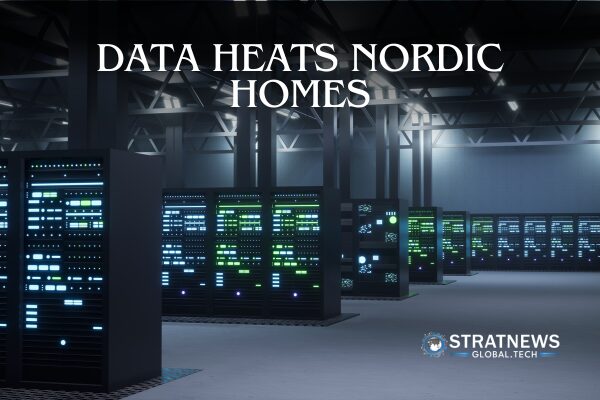Power-Hungry Data Centres Are Heating Nordic Homes
Across Finland and Sweden, a quiet energy revolution is underway. Once criticised for their huge electricity consumption, data centres are now helping to warm homes through innovative waste heat recovery systems. By linking computer server facilities to district heating networks, the Nordic region is finding new ways to balance digital growth with climate goals.
Turning Digital Heat into Home Warmth
In the Finnish town of Mäntsälä, engineer Ari Kurvi benefits from a 75-megawatt data centre just five kilometres from his home. The facility, which processes enormous amounts of digital data, transfers its excess heat to the local district heating grid. The system now supplies two-thirds of the town’s heating needs, cutting costs and carbon emissions.
Kurvi, who first experimented with heat recovery in 2009, helped scale up the idea through a project with Nebius Group NV. “There is warmth, there is cold, and maybe we can exchange something here,” he said, recalling the simple logic that sparked his innovation. His approach is now inspiring some of the world’s largest technology companies.
Microsoft is leading the next stage of this transformation. Near Helsinki, it is constructing a cluster of data centres that will provide heating for about 40% of Espoo — roughly 100,000 homes. The project has already allowed a local coal-fired heating plant to shut down, accelerating Finland’s path toward carbon neutrality.
A Model for Sustainable Energy
The Nordics offer ideal conditions for data centre efficiency. Their cold climate, low electricity prices and renewable power sources — mainly hydro, wind and nuclear — make operations cleaner and cheaper. Moreover, the extensive network of underground district heating pipes allows waste heat to be easily captured and reused.
In Espoo, Microsoft’s system will transfer lukewarm water from data centres to a heat recovery facility. Heat pumps will raise the temperature before sending the hot water into the city’s district grid. “These data centres are actually big fans, allowing electricity to be converted cheaply into heat,” said Espoo’s mayor, Kai Mykkänen.
Microsoft’s project, developed with energy firm Fortum, could eliminate carbon emissions from the local heating network by 2030. The company says the recovered heat will contribute about 1% of the cuts needed for Finland’s national carbon-neutral target.
Challenges and Regulation Ahead
Despite their environmental promise, data centres remain controversial because of their vast power use. In Ireland, they already consume around 20% of the country’s electricity, and similar concerns are emerging in Finland. Policymakers recently proposed scrapping a tax benefit for the sector, prompting one developer to cancel a planned project.
Geographic challenges also persist. Many data centres are built outside city centres, far from existing heating networks. In some cases, such as Microsoft’s site in Vihti, waste heat cannot be recovered, reducing the climate benefits.
Still, growing regulation is pushing the industry toward higher efficiency standards. Germany now requires new data centres to reuse at least 10% of their waste heat by 2026, rising to 20% by 2028. The European Union has also introduced binding energy-saving targets and mandatory reporting of electricity and water use for large data centres.
A Nordic Blueprint for the Future
In southern Stockholm, Conapto AB has already embraced the model, using waste heat from its 20-megawatt facility to warm 10,000 homes. “Sustainability will be a requirement for our clients,” said Conapto’s chief commercial officer, Stefan Nilsson. “We won’t build any new facilities without this technology.”
As more firms follow suit, waste heat recovery could become a defining feature of Europe’s digital infrastructure. Kurvi, now chief development officer at Hyperco, takes pride in seeing his idea spread. “There’s a word in Finnish: sisu — stubbornness, the determination to get something done,” he said. “That’s what made this possible.”


